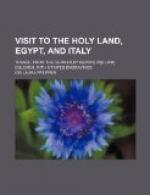The church of St. Peter and St. Paul is a spacious building, with a simple interior. The floor is covered merely with stone slabs; the walls are white-washed to the ceiling, but the upper portion is richly ornamented with arabesques. A beautiful picture hanging behind the high altar represents a storm at sea. The view from the hall of the convent is magnificent; we can overlook almost the entire island, and beyond our gaze loses itself in the boundless expanse of ocean.
Near the church stands a chapel, beneath which is St. Paul’s grotto, divided into two parts: in the first of these divisions we find a splendid statue of St. Paul in white marble; the second was the dungeon of the apostle.
Not far from this chapel, at the extremity of the town, are the catacombs, which resemble those at Rome, Naples, and other towns.
During our drive back we made a little detour to see the gorgeous summer-palace and garden of the governor.
The whole excursion occupied about seven hours. During my residence in Malta the heat varied from 20 to 25 degrees Reaumur in the sun.
CHAPTER XVIII.
The steamer Hercules—Syracuse—Neapolis—Ruins—Catanea—Convent of St. Nicholas—Messina—The Duke of Calabria—Palermo—The royal palace—Church of St. Theresa—St. Ignazio—Catacombs of the Augustine convent—Skeletons—Olivuzza —Royal villa “Favorite”—St. Rosalia—Brutality of the Italian mob—Luxuriant vegetation—Arrival at Naples.
October 4th.
At eight o’clock in the evening I embarked on board the Sicilian steamer Hercules, of 260-horse power, the largest and finest vessel I had yet seen. The officers here were not nearly so haughty and disobliging as those on board the Eurotas. Even now I cannot think without a smile of the airs the captain of the latter vessel gave himself. He appeared to consider that he had as good a right to be an admiral as Bruys.
At ten o’clock we steamed out of the harbour of Lavalette. As it was already dark night, I went below and retired to rest.
October 5th.
When I hurried on deck this morning I found we were already in sight of the Sicilian coast, and—oh happiness!—I could distinguish green hills, wooded mountains, glorious dells, and smiling meadows,—a spectacle I had enjoyed neither in Syria, in Egypt, nor even at Malta. Now I thought at length to behold Europe, for Malta resembles the Syrian regions too closely to favour the idea that we are really in Europe. Towards eleven o’clock we reached
Syracuse.




